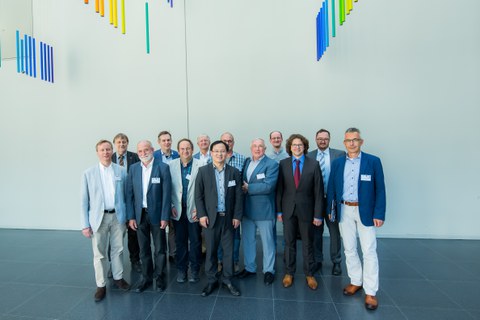Sep 08, 2016
Joint Kick-Off Event ESF „Graphene Center Dresden“ and 2.5D-Path of the Center for Advancing Electronics Dresden (cfaed)
On September 7th, the official start of the ESF-supported Young Researcher Group ‘Graphene Center Dresden’ (GraphD) took place at TU Dresden. In addition, the initiation of a new path dedicated to two dimensional materials within the Cluster of Excellence Center for Advancing Electronics Dresden (cfaed) was celebrated with the participation of very distinguished guests.
The Graphene Center Dresden is an ESF Young Researcher Group, funded by the European Social Fund (ESF), with strong collaboration of many chairs within TU Dresden under the supervision of cfaed’s Strategic Professorship ‘Molecular Functional Materials’ of Prof. Xinliang Feng. Cooperation partners include, e.g., Prof. Sibylle Gemming, Prof. Alexander Eychmüller, Prof. Stefan Kaskel, Prof. Karl Leo, Prof. Stefan Mannsfeld, Prof. Michael Schröter, Prof. Gotthard Seifert as well as Prof. Gianaurelio Cuniberti. All hold important functions within cfaed as research path leaders and principal investigators.
With this joint competence, TU Dresden will emerge as one of the most important European actors in the field of the “wonder material” graphene and related two-dimensional materials. These one-atom thin materials exhibit outstanding physical properties, which render them promising candidates for application in various fields of electronic and energy applications as well as, for instance, novel lubricants. Meanwhile, graphene has been implemented in the first industrial applications. This is also one of the core competences of the Graphene Center Dresden: The close relationship to industrial partners is an elementary part of its strategy.
The recently started ESF young researcher group ‘GraphD’ is an important milestone, funded by the European Social Fund (ESF). GraphD started on July 1st and consists of three postdocs, six PhD students, and the research group leader Dr. Reinhard Berger. Aims of the group are, amongst others, to attract the world’s most renowned young scientists in the field, train outstanding experts for Saxony’s industry, enforce the innovation potential of local companies, and to efficiently complement the regional cluster of ‘Silicon Saxony’.
The Center for Advancing Electronics Dresden currently prepares a proposal within the ‘Excellence Strategy’ of the German Federal and State governments. It’s program will be extended to include research of two-dimensional materials within a new ‘2.5D-path’.
Press Images
https://cfaed.tu-dresden.de/press-releases-201/kick-off-graphen-center-dresden
Media inquiries:
Prof. Xinliang Feng
cfaed Chair for Molecular Functional Materials
Phone: +49 (0) 351 463-43251
Matthias Hahndorf
Center for Advancing Electronics Dresden (cfaed)
Communications Officer
Phone: +49 (0) 351 463-42847
cfaed
cfaed is a microelectronics research cluster of the German Excellence Initiative. It comprises 11 cooperating institutes in Saxony. About 300 scientists from more than 20 countries investigate completely new technologies for electronic information processing. These technologies are inspired by innovative materials such as silicon nanowires, carbon nanotubes or polymers or based on completely new concepts such as the chemical chip or circuit fabrication methods by self-assembling structures e.g., DNA-Origami. The orchestration of these new devices into heterogeneous information processing systems with focus on their resilience and energy-efficiency is also part of cfaed’s research program which comprises nine different research paths.

